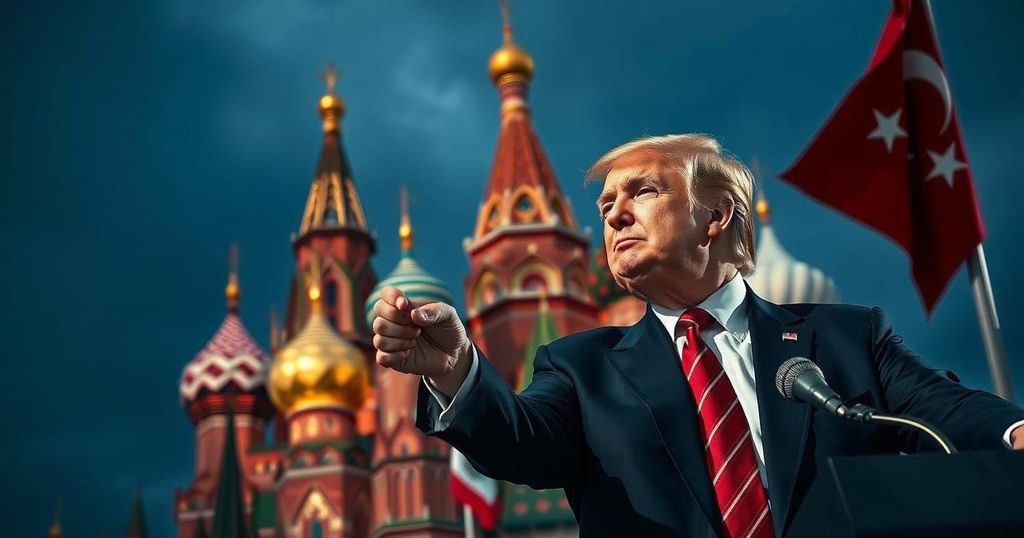Moscow’s Cautious Optimism for a Trump Second Term: A Reflection on U.S.-Russia Relations

The article examines Moscow’s changing perspective on a potential second term for Donald Trump. Following his initial victory in 2016, Russian officials were optimistic about improved relations. However, disappointment ensued due to strict sanctions during his presidency. Currently, Russian leaders are more circumspect regarding Trump’s return, while public sentiment reflects a mix of animosity and a longing for peace. The upcoming U.S. election may further influence these dynamics, as voices within Russia call for friendship rather than rivalry with the United States.
Moscow’s expectations for a potential second term for Donald Trump differ significantly from its previous hopes following his initial victory in 2016. At that time, Russian officials and social commentators celebrated Trump’s rise, believing it would lead to improved relations between the United States and Russia. One notable instance involved the ultranationalist politician Vladimir Zhirinovsky, who famously celebrated with 132 bottles of champagne. Other Russian figures, such as Margarita Simonyan of RT, expressed fervent support, including a planned drive around Moscow displaying an American flag. The anticipation revolved around the belief that Trump would withdraw sanctions against Russia and possibly legitimize the annexation of Crimea. Konstantin Remchukov, editor of Nezavisimaya Gazeta, remarked, “The value of Trump was that he never preached on human rights in Russia.” However, these hopes were dashed as Trump’s administration levied significant sanctions against Russia during his term, leading to widespread disappointment over the perceived missed opportunities for rapprochement. Fast forward to the present, Russian officials have adopted a more cautious stance regarding Trump’s potential re-election. President Vladimir Putin even jokingly supported the Democratic candidate Kamala Harris, noting her “infectious laugh.” Nevertheless, it is Trump’s controversial remarks, such as his skepticism of U.S. military support for Ukraine and a reluctance to directly blame Putin for the invasion, that still resonate positively with the Kremlin. In contrast, Harris’ firm stance on supporting Ukraine has been dismissed by some Russian media as lackluster. Additionally, there is a possibility that a tightly contested U.S. election could favor the Kremlin by distracting the American government from foreign affairs, allowing Russia to maneuver with less scrutiny. U.S.-Russia relations have steadily deteriorated since the Obama administration, worsened under Trump, and continue to decline under Biden, particularly post-invasion of Ukraine. Recalling the camaraderie of past U.S.-Russia relations, it is clear that the geopolitical landscape has shifted significantly since the days of Reagan and Gorbachev, who worked together to reduce nuclear arsenals. Presently, the relationship is marred by mutual suspicion and hostility, and public sentiment in Russia reflects a mix of animosity and a desire for peace. Many Russians express a longing for diplomatic engagement and a rejection of the narrative that the U.S. is inherently adversarial. For some, like Nikita, Trump symbolizes a period of stability: “When he was president there weren’t any big wars.” As the upcoming U.S. election looms, the opinions of Russian citizens reveal a desire for friendship and an end to hostilities, underscored by a complicated perspective on leadership styles in both nations, including the hope for greater gender diversity in political representation.
The article discusses the shifting attitudes of Moscow and its leaders towards a potential second term for Donald Trump as President of the United States. Initially, in 2016, there was a sense of optimism within Russia regarding Trump’s presidency and the prospect of improved bilateral relations. This optimism was fueled by expectations that Trump would lift sanctions imposed on Russia and overlook contentious issues concerning human rights and geopolitical conflicts. However, the subsequent imposition of heavy sanctions against Russia during Trump’s term led to disappointment in Moscow. Now, as the election draws near, Russian officials exhibit caution, particularly in light of Trump’s controversial stances and criticisms regarding U.S. support for Ukraine. The article further illustrates the complex sentiments towards America among ordinary Russians, who express both antagonism and a desire for peace, revealing a nuanced view that transcends state media narratives.
In conclusion, Moscow’s sentiments towards Donald Trump’s potential re-election are tempered by past experiences, highlighting a shift from exuberance to caution. While some Russian officials may still appreciate certain aspects of Trump’s foreign policy, widespread public opinion reflects a desire for improved relations and a peaceful resolution to ongoing conflicts. As the U.S. election approaches, the outcomes may have significant ramifications not only for the United States but for global geopolitics as well, particularly concerning Russian-American relations.
Original Source: www.bbc.com





